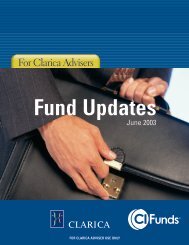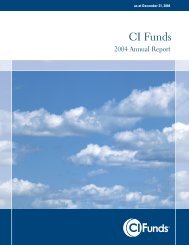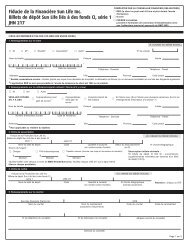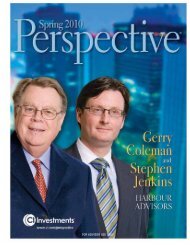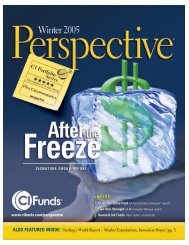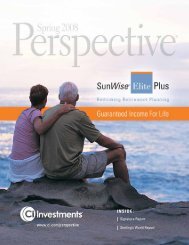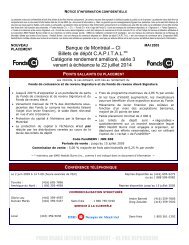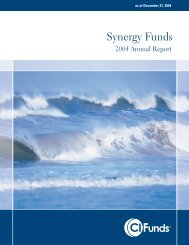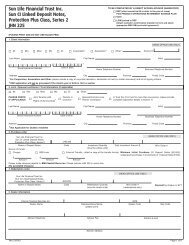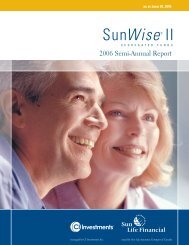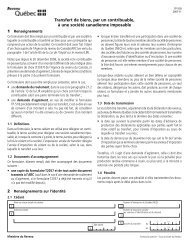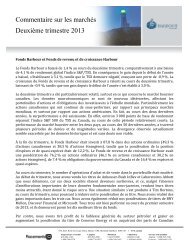July - Summer Edition - CI Investments
July - Summer Edition - CI Investments
July - Summer Edition - CI Investments
Create successful ePaper yourself
Turn your PDF publications into a flip-book with our unique Google optimized e-Paper software.
Commentary<br />
Stephen Jenkins<br />
Senior Vice-President, <strong>Investments</strong><br />
Harbour Foreign Equity Corporate Class<br />
and Harbour Foreign Growth & Income<br />
Corporate Class<br />
Results for Harbour’s two global fund portfolios for the three<br />
months ended June 30 were essentially flat during the quarter.<br />
Harbour Foreign Equity produced a slight increase of 0.5%<br />
during the quarter, while Harbour Foreign Growth & Income<br />
saw a slight decrease of 0.7%. The MS<strong>CI</strong> World Index (C$)<br />
experienced a modest decline of 0.3% over the period.<br />
Harbour Foreign Equity ended the quarter with 91% of the<br />
assets invested in global stocks; cash was 9%. We began the<br />
quarter with ownership in 39 companies. During the three<br />
months, we initiated two new positions and sold two – keeping<br />
our tally unchanged. Of the 39 companies currently in the<br />
portfolio, 18 are domiciled in North America, 14 in Europe,<br />
and seven within the Asia-Pacific region.<br />
MasterCard, our single largest holding, was the top contributor<br />
during the quarter. The long-awaited final ruling with regard<br />
to interchange fees (the Durbin Amendment) within the credit<br />
card industry was released toward quarter-end. In a nutshell, the<br />
ruling proved less onerous to industry players and a lingering<br />
cloud of uncertainty was lifted. Most importantly, the close<br />
of this regulatory chapter will allow the market to once again<br />
focus on the fundamentals of the underlying business – which<br />
in MasterCard’s case are exceptionally strong.<br />
Other notable contributors to performance include Diageo,<br />
Discover Financial, Foster’s Group, and GlaxoSmithKline.<br />
Predominant detractors were Hess Corp, Nintendo, Suncor<br />
Energy, and Ultra Petroleum.<br />
Buying during the quarter included the addition of two new<br />
positions – one a small U.K.-based food services company, the<br />
other a mid-sized U.S.-based consumer products packaging<br />
company. We are still in the process of building these positions<br />
and as a result they both remain undisclosed at this time.<br />
On the other side, we sold our positions in Schneider Electric<br />
and Grafton Group – booking gains in each case. Challenging<br />
operating environments, coupled with relatively high<br />
valuations, were the main reasons for selling. In addition, we<br />
reduced our holdings in food manufacturer Nestlé and energy<br />
service company Patterson UTI during the quarter.<br />
The asset mix of the Harbour Foreign Growth & Income at<br />
quarter-end was little changed during the quarter: 75% stocks,<br />
8% bonds, 17% cash and equivalents. On an absolute basis,<br />
and relative to stocks, bonds remain highly unattractive in<br />
our mind as a long-term investment choice. With real yields<br />
near zero for leading sovereign credits, investors are not being<br />
properly compensated for the risks associated with owning<br />
these low-yielding securities over the coming years. We have<br />
been finding some wonderful alternative income streams in the<br />
form of good old dividend-paying stocks. We will continue to<br />
seek out opportunities to raise the contribution within Harbour<br />
Foreign Growth & Income from high-quality, robust dividendpaying<br />
companies. In fact, since quarter-end, our cash balance<br />
has dropped due to further additions to the portfolio.<br />
As we enter the second half of 2011, investors are worried about<br />
a number of global economic issues: Greece’s debt problems,<br />
the end of quantitative easing (QE2), inflationary pressures<br />
in the emerging economies, high levels of unemployment,<br />
and the ineffectual negotiations surrounding the looming<br />
deadline to raise the U.S. debt ceiling. We, on the other<br />
hand, are focused on the attractive underlying fundamentals<br />
of today’s markets, which include strong corporate balance<br />
sheets, growing corporate earnings, share repurchases, higher<br />
dividend payouts, a nascent mergers and acquisition cycle,<br />
accommodative monetary policy and inexpensive stock<br />
valuations. These important fundamentals and underpinnings<br />
are likely to prove significant drivers of stock returns over the<br />
coming periods, outweighing the many press-worthy economic<br />
issues that are besieging the investing public.<br />
We feel very good about the way our portfolios are currently<br />
structured. Growth prospects for our invested companies<br />
remain attractive, their balance sheets are strong and their<br />
valuations are modest – all reasons for us to remain optimistic.<br />
Analysts: Douglas Cooper, Phil D’Iorio, Jared Spice,<br />
Aleksy Wojcik<br />
Additionally, we took advantage of weakness within the<br />
financial sector to boost our positions in both JPMorgan Chase<br />
and BNY Mellon.<br />
SUMMER 2011 PERSPECTIVE AS AT JUNE 30, 2011 33



